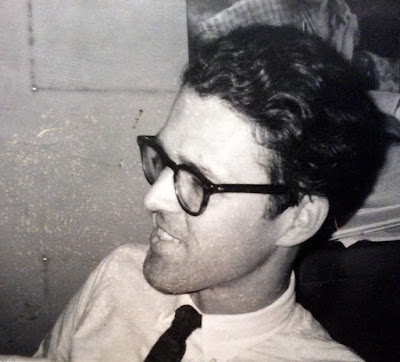David Shepherd’s Journals by Michael Golding
[ad_1]
David
Shepherd (October 10, 1924 – December 17, 2018) the co-founder of Playwrights
Theatre Club, Compass (forerunner of Second City), the Improv Olympics and
Canadian Improv Games, left behind a library of personal journals. David was
diligent about making daily entries, a practice he started at thirteen, inspired
by his father William Edgar Shepherd, an architect, and continued into his
nineties. The journals are replete with designs for new forms of theatre and
outlines for potential books. I am including two brief excerpts. David’s journals, along with his archives,
were donated to Northwestern University’s Charles Deering McCormick Library of
Special Collections in 2016 and are currently being processed.
MANIFESTO
BLUEPRINT FOR THE NEW FREE THEATRE
(NFT)
Paris 1949
The NFT
should be small at first. The connection between actor and audience has been
lost in the coy hypocrisy of the realistic theatre but can be found again by
testing effects at close range. To counteract the sloppy diffusion of the
modern sensibility, the NFT will be, if nothing else, vigorous and disciplined.
Discipline is necessary both for conciseness and for style. In modern acting
efficiency is lost in movement and speech; both are diffuse and meaningless
since both copy natural life, which is almost always diffuse and meaningless.
A
play cannot be a novel because a play has only an hour or two to make its mark.
The single exception in this rule is Chekhov. Great craftsmen of today
(Picasso, Rouault, Pound, Thomas, Stravinsky, Hindemith) either set out to work
in any style or else limit themselves severely to one. Great drama is not
written today because playwrights have cut themselves not only from the roots
of drama but also from the understanding use of styles. We need both eclectic genius and the craftsman
with a single tool and single sheet of metal.
The vigorous
roots of drama are song and dance, which must be brought back, if not outright,
then in precise and suggestive speech and movement.
Since a play
is the most clearly social of all art forms, the NFT must assure directness and
simplicity in its productions. Whatever conventions it adopts must be quickly
understandable.
 |
| Journal entry |
MANIFESTO – SYNOPSIS OF INTRO TO BOOK
August 1952
The first
purpose of this book is to advertise a theatre movement.
We are
working to build a body of good American plays on the assumption that a great
play has yet to come out of America, that the theatre of the future will be the
“popular” theatre, and that we have discovered some of the ways of writing
better plays than the current crop offers. We need partners to help us.
 |
| David Shepherd |
We believe
the easiest way to get the good plays we need is by attending to style; you
will find exercises in this book which show what we mean by style. We believe
that plays can be written on any subject, in any style and to any length: in
this book you will find copies of the styles of some major dramatists today. In
other words, we believe plays are logical statements, not bursts of
inspiration.
Just as
style is an exploitation of the word, so the choice of the action or subject
matter of a play is an exploitation of the world of the dramatist. We deplore
the fact that whereas the world of the dramatist today is so broad, his plays
are so narrow. We give reasons in this book for such a paradox, and we explain
what our second problem is after style: to broaden the frame and focus the
thought of our plays. We suggest some dramatic forms by which that can be done,
although we doubt that bourgeois writers will want to use them.
 |
| Journal entry |
teacher. He can be contacted for
workshops, festivals and private consultations at migaluch@yahoo.com. Michael participated in the evolution of the
Improv Olympics & Canadian Improv Games. Artistic director of the Comic
Strip Improv Group in N.Y. & created the Insight Theatre Company for
Planned Parenthood,
in
working with at-risk teens and traditional students. He wrote and co-produced
the documentary “David Shepherd: A Lifetime of Improvisational
Theatre” (available for free on YouTube).
His book, Listen Harder, a collection of essays, curriculum and
memorabilia on improvisation and educational theatre, is available on Amazon,
Barnes & Noble and CreateSpace. Michael holds a BFA degree in Drama from
New York University’s Tisch School of the Arts & an MA degree in
Educational Theatre from NYU’s Steinhardt School of Culture, Education &
Human Development.
[ad_2]
Source link